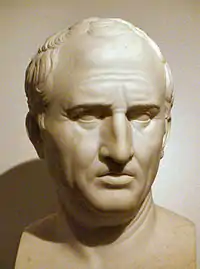Cicero
Marcus Tullius Cicero[1] (3 January 106 BC – 7 December 43 BC) was a Roman statesman, consul, lawyer, political theorist and philosopher. He is often thought to be one of Rome's greatest orators and prose stylists.[2][3]
Marcus Tullius Cicero | |
|---|---|
 Marcus Tullius Cicero | |
| Born | 3 January 106 BC Arpinum, Italy |
| Died | 7 December 43 BC Formia, Italy |
| Occupation | Politician, lawyer, orator and philosopher |
| Nationality | Ancient Roman |
| Subject | politics, law, philosophy, oratory |
| Literary movement | Golden Age Latin |
| Notable works | Politics: Pro Quinctio Philosophy: De Inventione |

His Latin is thought to be the model of Classical Latin. He introduced Greek philosophy to the Romans.
Cicero was heavily involved in the politics of the Roman Republic. After Julius Caesar's death, Cicero became an enemy of Mark Antony. In the power struggle, Cicero attacked Antony in a series of speeches. Cicero was proscribed as an enemy of the state by the Second Triumvirate. He was executed in 43 BC by soldiers working for the Triumvirate.
References
- Latin pronunciation: ['kikeroː], usually pronounced [ˈsɪsərəʊ] in English
- Rawson, E.: Cicero, a portrait (1975) p.303
- Haskell, H.J.: This was Cicero (1964)p.300-301
Sources
- Everitt, Anthony 2001, Cicero: the life and times of Rome's greatest politician, Random House, hardback, 359 pages, ISBN 0-375-50746-9
- Haskell, H.J.: (1946) This was Cicero, Fawcett publications, Inc. Greenwich, Conn. USA
- Rawson, Elizabeth (1975) Cicero, A portrait, Allen Lane, London ISBN 0-7139-0864-5
- Taylor, H. (1918). Cicero: A sketch of his life and works. Chicago: A. C. McClurg & Co.
Other websites
Latin Wikisource has original writing related to this article:
Wikiquote has a collection of quotations related to: Cicero
Wikimedia Commons has media related to Cicero.
General
- Links to Cicero resources Archived 2006-09-05 at the Wayback Machine
- University of Texas Cicero Homepage Archived 2005-11-25 at the Wayback Machine
- The Internet Encyclopædia of Philosophy
Works by Cicero
- Works by Cicero at Project Gutenberg
- Perseus Project (Latin and English): Classics Collection (see: M. Tullius Cicero)
- The Latin Library (Latin): Works of Cicero
- UAH (Latin, with translation notes): Cicero Page Archived 2006-02-21 at the Wayback Machine
- De Officiis, translated by Walter Miller
- Cicero's works: text, concordances and frequency list
- Biographies and descriptions of Cicero's time:
- At Project Gutenberg
- Plutarch's biography of Cicero contained in the Parallel Lives
- Life of Cicero by Anthony Trollope, Volume I – Volume II
- Cicero by Rev. W. Lucas Collins (Ancient Classics for English Readers)
- Roman life in the days of Cicero by Rev. Alfred J. Church
- Social life at Rome in the Age of Cicero by W. Warde Fowler
- At Heraklia website Archived 2006-05-17 at the Wayback Machine
- Dryden's translation of Cicero from Plutarch's Parallel Lives Archived 2011-10-01 at the Wayback Machine
- At Middlebury College website
- Prætor Brutus Archived 2008-12-09 at the Wayback Machine
- At Project Gutenberg
- News article on a museum-guide robot named after him
| Preceded by Lucius Julius Caesar and Gaius Marcius Figulus |
Consul of the Roman Republic with Gaius Antonius Hybrida 63 BC |
Succeeded by Decimus Junius Silanus and Lucius Licinius Murena |
This article is issued from Wikipedia. The text is licensed under Creative Commons - Attribution - Sharealike. Additional terms may apply for the media files.